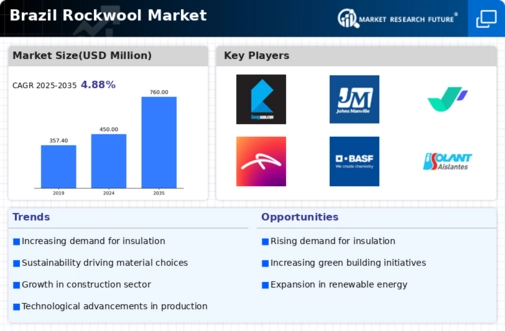Growing Construction Sector
The Brazil rockwool market is experiencing a notable surge due to the expanding construction sector. With the Brazilian government investing heavily in infrastructure projects, the demand for insulation materials, including rockwool, is on the rise. In 2025, the construction sector contributed approximately 6.5% to the national GDP, indicating a robust growth trajectory. This growth is further fueled by urbanization trends, as more people migrate to urban areas, necessitating the development of residential and commercial buildings. Rockwool's properties, such as fire resistance and sound insulation, make it a preferred choice among builders and architects. As the construction industry continues to flourish, the Brazil rockwool market is poised to benefit significantly from this trend.
Increased Awareness of Fire Safety
Fire safety has become a paramount concern in Brazil, significantly impacting the rockwool market. With the rise in urbanization and high-density living, the need for fire-resistant materials in construction has escalated. Rockwool is renowned for its excellent fire-resistant properties, making it an ideal choice for insulation in both residential and commercial buildings. In 2025, it is estimated that the demand for fire-resistant insulation materials in Brazil increased by 15%, reflecting a growing awareness of fire safety standards. This trend is likely to continue, as both consumers and builders prioritize safety in their construction projects. Consequently, the Brazil rockwool market stands to gain from this heightened focus on fire safety.
Technological Innovations in Production
Technological advancements in the production of rockwool are significantly influencing the Brazil rockwool market. Innovations such as improved melting techniques and automated manufacturing processes have enhanced the efficiency and quality of rockwool products. These advancements not only reduce production costs but also minimize environmental impact, aligning with the growing demand for sustainable materials. In 2025, the introduction of new production technologies is expected to increase the output of rockwool by approximately 20%, catering to the rising demand from the construction sector. As manufacturers adopt these technologies, the Brazil rockwool market is likely to experience enhanced competitiveness and growth.
Regulatory Support for Sustainable Materials
The Brazil rockwool market is bolstered by increasing regulatory support for sustainable building materials. The Brazilian government has implemented various policies aimed at promoting eco-friendly construction practices. For instance, the National Policy on Solid Waste encourages the use of recyclable materials, which aligns with rockwool's sustainable production process. Additionally, the Brazilian Association of Technical Standards (ABNT) has established guidelines that favor the use of materials with low environmental impact. This regulatory framework not only enhances the market appeal of rockwool but also encourages manufacturers to innovate and improve their sustainability practices. As a result, the Brazil rockwool market is likely to see a rise in demand as builders seek to comply with these regulations.
Rising Demand for Energy-Efficient Solutions
The Brazil rockwool market is witnessing a surge in demand for energy-efficient insulation solutions. As energy costs continue to rise, both consumers and businesses are increasingly seeking materials that enhance energy efficiency in buildings. Rockwool, with its superior thermal insulation properties, plays a crucial role in reducing energy consumption. In 2025, it is projected that the market for energy-efficient insulation materials in Brazil will grow by 12%, driven by government incentives for energy-efficient construction. This trend is further supported by consumer awareness of energy conservation and sustainability. As a result, the Brazil rockwool market is well-positioned to capitalize on this growing demand for energy-efficient solutions.






















